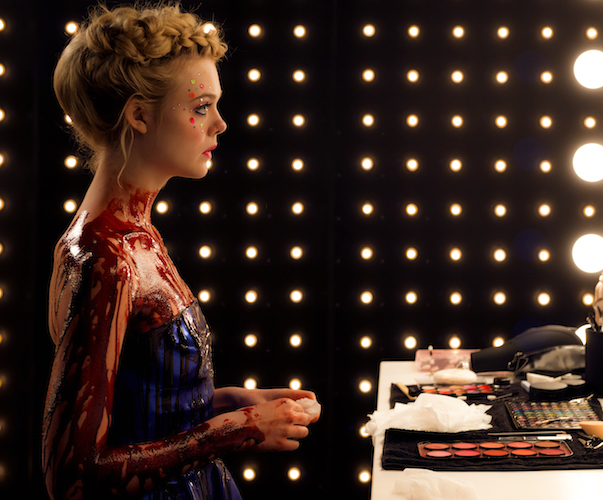Fuse Film Review: “The Neon Demon” — It Was Beauty that Killed the Beast
Not one for subtlety, director Nicholas Winding Refn has turned the dark side of modeling into a horror film, one that will no doubt generate plenty of controversy.
The Neon Demon, directed by Nicholas Winding Refn. Screening at Loew’s Boston Common 19 and Kendall Square Cinema.

Elle Fanning in a scene from “The Neon Demon.”
By Tim Jackson
During Nicholas Winding Refn’s film The Neon Demon we spend a lot of time gazing at clean open spaces and emptily decadent LA streets. The latter are populated by beautiful models who, in turn, glare at one another. For these creatures of terminal self-regard, appearance is the essence of life. It is also the essence of a death cult that is rooted in a soulless obsession with beauty as success. An unfettered embrace of narcissism and style earn the willing membership in a cutthroat nihilist club, its acolytes cutting, altering, and embalming themselves in order to reach an imagined ideal that gives them an opportunity to be paraded out on the runway, or frozen forever in unsmiling portraits. Not one for subtlety, Refn has turned the dark side of modeling into a horror film, one that will no doubt generate plenty of controversy.
Elle Fanning is Jesse, a quiet, wide-eyed and innocent newcomer to the LA fashion scene. Encouraged to give her age as 19, she claims to be only 16. At first, she appears lost, at the mercy of rapacious cohorts and an exploitative motel owner played by a sleazy Keanu Reeves. She is defended by an earnest male friend named Dean, played by Karl Glusman, who ironically starred in Gasper Noe’s 2015 3-D hardcore film Love. Considerate of her age, he becomes her defender. There are no shenanigans between the two and their relationship remains platonic.
Despite her waifish appearance and seeming vulnerability, Jesse has a competitive heart of steel, or more accurately, of ice. Her delicate and flawless surface may very well be hiding a truly hideous person. Make no mistake, despite the ‘well-meaning’ advice and jealousy of her fellow models, Jesse knows she is more beautiful and mysterious than all the others (her alluring air of innocence does the trick); she has just what it takes to grab whatever gigs come her way. But envy and pride can (and will) be lethal. Fanning is an extraordinary actress, fearlessly gliding Jesse between playing the roles of ingenuous waif and sly opportunist. She’s a treat to watch, and watch we do: the camera worships her. In a rare decision of good taste, however, the 18-year-old actress does not appear nude.
As the film creeps along everything begins to unwind. If you think you’ve reached the end of Jesse’s story, hang on there’s more. That the narrative will move into surreal is hinted early on when Jesse returns to her hotel room to find a mountain lion. It is a clever nod to the psychological horror of the Val Lewton/Jacques Tourneur film Cat People. Like that stylish 1942 thriller, Refn favors a leisurely pace punctuated by explosive acts of violence.
To put it mildly, The Neon Demon is not a film for every taste. It is very easy to accuse the director of exploiting the very subject he parodies with lethal intent. Much of the tension, however, comes from the stillness in Fanning’s eerie performance, accentuated by an unrelenting synth score by Cliff Martinez. It is Refn’s third collaboration with the composer, whose background includes drumming for the Red Hot Chile Peppers and Captain Beefheart.
The measured tempo of the film, its quiet, pristine atmosphere peppered with occasional bursts of shock, eventually gives way to a dreamlike, blood-soaked climax. The expressionist colors and poisonous erotic atmosphere recall the Italian Giallo art-horror films of directors like Mario Bava and Dario Argento. But this is very much a Refn creation, marked by its glittery surfaces and sharp casting: in addition to Reeves, Christina Hendrix plays an untrustworthy agent, Desmond Harrington a decadent photographer, and Alessandro Nivola, a heartless fashion designer. No spoilers, but a word of heartfelt advice for the viewer. When the story finally erupts, many of you may head for the door. Be warned.
Tim Jackson was an assistant professor of Digital Film and Video for 20 years. His music career in Boston began in the 1970s and includes some 20 groups, recordings, national and international tours, and contributions to film soundtracks. He studied theater and English as an undergraduate, and has also has worked helter skelter as an actor and member of SAG and AFTRA since the 1980s. He has directed three feature documentaries: Chaos and Order: Making American Theater about the American Repertory Theater; Radical Jesters, which profiles the practices of 11 interventionist artists and agit-prop performance groups; When Things Go Wrong: The Robin Lane Story, and the short film The American Gurner. He is a member of the Boston Society of Film Critics. You can read more of his work on his blog.

